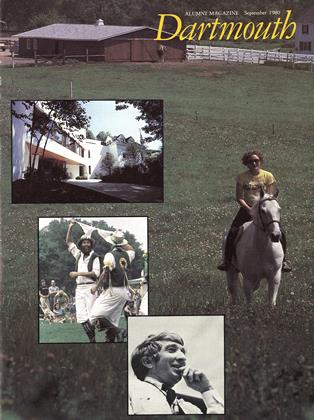The Bequest and Estate Planning Program is not the razzle-dazzle part of fund-raising at Dartmouth. Testamentary giving is deferred giving, and at Dartmouth it is also primarily endowment enrichment. Donors will not get to see their names emblazoned on buildings or publicized in professorships. President Dickey once called it the"most delicate" form of assistance Dartmouth enjoys.
One of the first of Dartmouth's sons to recognize the importance of a College-wide program encouraging alumni bequests and estate-planning gifts was Ford H. Whelden '25, whose vision in recommending to the Alumni Council, in 1934, the adoption of such a program is equaled only by his patience in seeing the program through 17 years of back-burner consideration to its adoption in 1951.
But let it be said that at least Ford Whelden has been honored as a prophet in his own country. Never sufficiently, perhaps, for so great a devotion (Whelden, who has four daughters, has been heard to claim Dartmouth as his fifth), but always sincerely. The first Dartmouth bequest- chairman-of-the-year and the only Dartmouth bequest-chairman-of-the-quarter- century, Whelden was presented with a surprise new award this past June. To celebrate what has been a landmark year for the Bequest and Estate Planning Program in May of 1980, total receipts credited to the program since its inception crossed the $l00-million mark the Ford H. Whelden 1925 Award has been created, to be given annually to the Dartmouth class-bequest-chairman-of-the-year.
There was a lot to celebrate this year, in fact. The 66th annual Alumni Fund campaign went well over its dollar goal of $6.6 million and achieved 63 per cent participation, a new high that puts Dartmouth squarely in the lead among the nation's major alumni funds. The 12 reunion classes alone raised a total of $2.7 million, the classes of 1940, 1944, and 1946 setting new reunion dollar records in the process. Even Dartmouth's youngest generation, the class of 1980 (which obviously is not going to the dogs), pledged a sturdy $9,878.
The five-year Campaign for Dartmouth is no laggard, either. Gifts and pledges of $112,958,778 put the campaign ahead of schedule for the end of June, and the $160 million goal, set for the end of 1982, gleams within reach. The Parents Committee of the campaign accepted a major role in raising matching funds for the $750,000 challenge grant made recently to Dartmouth by the National Endowment for the Humanities. The committee intends to raise $1.5-million and establish two Dartmouth Parents Distinguished Professorships in the Humanities.
Speaking of parents, Imre Cholnoky once again led the annual Dartmouth Parents Fund to a record contribution $282,000 this time from 1,875 non-alumni parents.
Last spring there was one $1-million bequest from the late Loren M. Berry of Dayton, Ohio, and another from the late Peter Kiewit '22; the Rockefeller family pledged $3.75 million toward the new Nelson A. Rockefeller Center for the Social Sciences; Mr. and Mrs. S. Furber Haight '21 gave real estate valued at $340,000 (slated for the construction of much- needed women's locker facilities); $52,000 was given by the Charles E. Culpeper Foundation of New York City for enlargement and renovation of the Moosilauke Ravine Lodge; and a $200,000 fund establishing the Claire Barber Goodman Grants for the Anthropological Study of Human Culture was made by Lawrence B. Goodman '31 in memory of his wife, a noted anthropologist. Oh yes and the Council for Advancement and Support of Education has just cited Dartmouth for sustained excellence in its alumni giving program.
 View Full Issue
View Full Issue
More From This Issue
-
 Feature
FeatureThe Dartmouth Animal and The Hypermasculine Myth
September 1980 By Leonard L. Glass -
 Feature
FeatureMonitoring Nature's Big Blow-Up
September 1980 By Dan Nelson -
 Cover Story
Cover StoryHorsin' Around
September 1980 By Marsha Belford -
 Article
ArticleCombating the Crippler
September 1980 By D.M.N. -
 Article
ArticleColor, Charm, Whatever
September 1980 -
 Article
ArticleSteel Elected
September 1980








